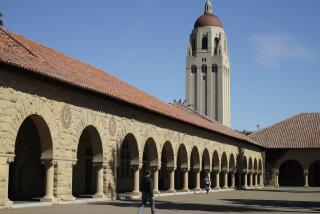Readers React: False assumptions underpin the Broad Foundation’s prize for schools
To the editor: Billionaire Eli Broad, whose foundation has suspended a $1-million prize for outstanding public school systems, has not realized the improvement in urban schools that he would like because his philanthropy has been based on a false assumption: Like most people, he has confused education with schooling. (“Broad Foundation suspends $1-million prize for urban school districts,” Feb. 18)
A person’s education is informal (home and community) and formal (school). Experts tell us that a child’s scholastic achievement, as measured by a standardized test, reflects mostly the child’s socioeconomic background. For this reason, an emphasis on schooling alone would show little improvement in a child’s education.
Broad is now concentrating on charter schools. But if you take a few students and improve education for them, does that mean you’ve improved “urban education,” or have you just improved it for a few students?
We know that academic achievement correlates closely with home circumstances. Instead of putting the entire burden of education on the school, perhaps it’s time to respond to the research.
Linda Mele Johnson, Long Beach
..
To the editor: We should not take issue with Broad’s decision to suspend prizes for urban school systems. Providing financial incentives for many urban schools reflects a misunderstanding of the reasons for much of their substandard academic performance.
If Broad wishes to truly influence educational reform in urban areas, he may want to have his staff look into addressing the causes of severe poverty that affect the school performance of so many urban school students and their families.
Stu Bernstein, Santa Monica
Follow the Opinion section on Twitter @latimesopinion and Facebook
More to Read
A cure for the common opinion
Get thought-provoking perspectives with our weekly newsletter.
You may occasionally receive promotional content from the Los Angeles Times.






